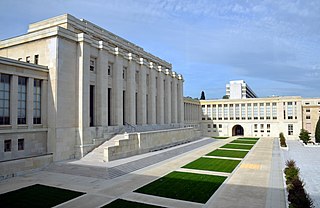A business organization may refer to
| | This disambiguation page lists articles associated with the title Business organization. If an internal link led you here, you may wish to change the link to point directly to the intended article. |
A business organization may refer to
| | This disambiguation page lists articles associated with the title Business organization. If an internal link led you here, you may wish to change the link to point directly to the intended article. |
ISO 3166 is a standard published by the International Organization for Standardization (ISO) that defines codes for the names of countries, dependent territories, special areas of geographical interest, and their principal subdivisions. The official name of the standard is Codes for the representation of names of countries and their subdivisions.

The International Organization for Standardization is an international standard-setting body composed of representatives from various national standards organizations.

The Ku Klux Klan, commonly shortened to the KKK or the Klan, is an American white supremacist hate group whose primary targets are African Americans. Lesser enemies of the Klan include Jews, immigrants, leftists, homosexuals, Muslims and, until recently, Catholics. The Klan has existed in three distinct eras at different points in time during the history of the United States. Each has advocated extremist reactionary positions such as white nationalism, anti-immigration and – especially in later iterations – Nordicism, antisemitism, prohibition, right-wing populism, anti-communism, homophobia, Islamophobia, anti-atheism, and anti-Catholicism. Historically, the first Klan used terrorism – both physical assault and murder – against politically active blacks and their allies in the Southern United States in the late 1860s, until it was suppressed around 1872. All three movements have called for the "purification" of American society and all are considered "right-wing extremist" organizations. In each era, membership was secret and estimates of the total were highly exaggerated by both friends and enemies.

Management is the administration of an organization, whether it is a business, a not-for-profit organization, or government body.

The United Nations (UN) is an intergovernmental organization that aims to maintain international peace and security, develop friendly relations among nations, achieve international cooperation, and be a centre for harmonizing the actions of nations. It is the largest, most familiar, most internationally represented and most powerful intergovernmental organization in the world. The UN is headquartered on international territory in New York City, with its other main offices in Geneva, Nairobi, Vienna, and The Hague.

The World Health Organization (WHO) is a specialized agency of the United Nations responsible for international public health. The WHO Constitution, which establishes the agency's governing structure and principles, states its main objective as "the attainment by all peoples of the highest possible level of health." It is headquartered in Geneva, Switzerland, with six semi-autonomous regional offices and 150 field offices worldwide.

The World Trade Organization (WTO) is an intergovernmental organization that is concerned with the regulation of international trade between nations. The WTO officially commenced on 1 January 1995 under the Marrakesh Agreement, signed by 123 nations on 15 April 1994, replacing the General Agreement on Tariffs and Trade (GATT), which commenced in 1948. It is the largest international economic organization in the world.
Human resources is the set of the people who make up the workforce of an organization, business sector, industry, or economy. A narrower concept is human capital, the knowledge which the individuals embody. Similar terms include manpower, labor, personnel, associates or simply people.

Organizations which are independent of government involvement are known as non-governmental organizations or non-government organizations, with NGO as an acronym. NGOs are a subgroup of organizations founded by citizens, which include clubs and associations that provide services to their members and others. NGOs are usually nonprofit organizations, and many of them are active in humanitarianism or the social sciences. Surveys indicate that NGOs have a high degree of public trust, which can make them a useful proxy for the concerns of society and stakeholders. However, NGOs can also be lobby groups for corporations, such as the World Economic Forum. According to NGO.org, "[an NGO is] any non-profit, voluntary citizens' group which is organized on a local, national or international level ... Task-oriented and driven by people with a common interest, NGOs perform a variety of service and humanitarian functions, bring citizen concerns to Governments, advocate and monitor policies and encourage political participation through provision of information."

A chief executive officer (CEO), chief administrator, or just chief executive (CE), is one of a number of corporate executives in charge of managing an organization – especially an independent legal entity such as a company or nonprofit institution. CEOs find roles in a range of organizations, including public and private corporations, non-profit organizations and even some government organizations. The CEO of a corporation or company typically reports to the board of directors and is charged with maximizing the value of the business, which may include maximizing the share price, market share, revenues or another element. In the non-profit and government sector, CEOs typically aim at achieving outcomes related to the organization's mission, such as reducing poverty, increasing literacy, etc.

C++ is a general-purpose programming language created by Bjarne Stroustrup as an extension of the C programming language, or "C with Classes". The language has expanded significantly over time, and modern C++ now has object-oriented, generic, and functional features in addition to facilities for low-level memory manipulation. It is almost always implemented as a compiled language, and many vendors provide C++ compilers, including the Free Software Foundation, LLVM, Microsoft, Intel, Oracle, and IBM, so it is available on many platforms.
A nonprofit organization (NPO), also known as a non-business entity, not-for-profit organization, or nonprofit institution, is a legal entity organized and operated for a collective, public or social benefit, in contrast with an entity that operates as a business aiming to generate a profit for its owners. A nonprofit is subject to the non-distribution constraint: any revenues that exceed expenses must be committed to the organization's purpose, not taken by private parties. A wide array of organizations are nonprofit, including most political organizations, schools, business associations, churches, social clubs, and consumer cooperatives. Nonprofit entities generally seek approval from governments to be tax-exempt, and some may also qualify to receive tax-deductible contributions. But an entity may incorporate as a nonprofit entity without securing tax-exempt status.

An organization, or organisation, is an entity – such as a company, an institution, or an association – comprising one or more people and having a particular purpose.
A 501(c) organization is a nonprofit organization in the federal law of the United States according to Internal Revenue Code Section 501(c) and is one of over 29 types of nonprofit organizations exempt from some federal income taxes. Sections 503 through 505 set out the requirements for obtaining such exemptions. Many states refer to Section 501(c) for definitions of organizations exempt from state taxation as well. 501(c) organizations can receive unlimited contributions from individuals, corporations, and unions.
A 501(c)(3) organization is a corporation, trust, unincorporated association, or other type of organization exempt from federal income tax under section 501(c)(3) of Title 26 of the United States Code. It is one of the 29 types of 501(c) nonprofit organizations in the US.

An international organization is an organization established by a treaty or other instrument governed by international law and possessing its own international legal by personality, such as the United Nations, the World Health Organization and NATO. International organizations are composed of primarily member states, but may also include other entities, such as other international organizations. Additionally, entities may hold observer status.

The United Nations Educational, Scientific and Cultural Organization is a specialised agency of the United Nations (UN) aimed at promoting world peace and security through international cooperation in education, the sciences, and culture. It has 193 member states and 11 associate members, as well as partners in the nongovernmental, intergovernmental, and private sector. Headquartered in Paris, France, UNESCO has 53 regional field offices and 199 national commissions that facilitate its global mandate.
A president is a leader of an organization, company, community, club, trade union, university or other group. The relationship between a president and a chief executive officer varies, depending on the structure of the specific organization. In a similar vein to a chief operating officer, the title of corporate president as a separate position is also loosely defined; the president is usually the legally recognized highest rank of corporate officer, ranking above the various vice presidents, but on its own generally considered subordinate, in practice, to the CEO. The powers of a president vary widely across organizations and such powers come from specific authorization in the bylaws like Robert's Rules of Order.